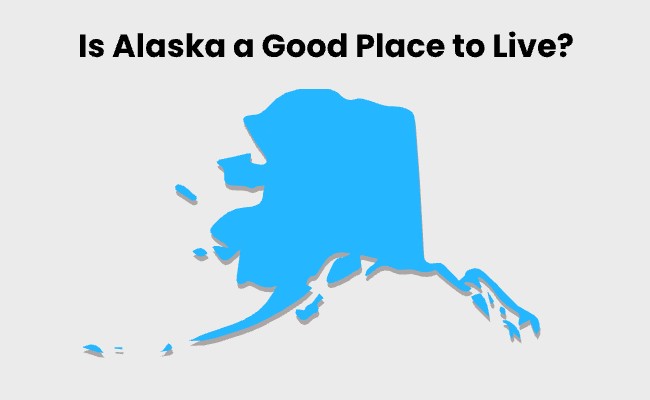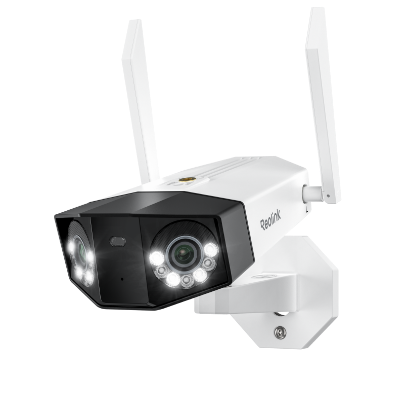Is Alaska a Good Place to Live? Pros and Cons to Consider

One of the things that makes Alaska such a great place to be is the huge amount of wildlife and natural beauty it holds. However, some people may be wondering if it has been a decent place to live due to its isolated location, harsh environment, and expense of living. We’d like to help you make the decision of whether is Alaska a good place to live, and the rest of this article covers living in Alaska pros and cons in more detail.
If you live in Alaska and need a reliable security camera to protect your property, take a look at the new Reolink Duo 3 WiFi. It's built tough to handle harsh environments and all kinds of weather conditions.
Groundbreaking 16MP Dual-Lens WiFi Camera
16MP UHD, Dual-Lens, Motion Track, 180° Wide Viewing Angle, Plug-In WiFi, Color Night Vision.
Is Alaska a Good Place to Live?
For a certain type of person, we believe it can be a good place to live. For those who like fishing, hunting, skiing, hiking, etc., outdoor activities, Alaska may be a nice paradise. But people who are rugged individualists and want to satisfy their wanderlust can get away from the crowds, even in cities, just by not crossing a state line.
But Alaska isn’t for everyone. The long, dark winters can be depressing for some people. The living costs are particularly onerous, particularly in terms of housing, food, and fuel. Oil, fishing, tourism, and government are the only jobs, and there are few jobs with much more developed infrastructure and services than in other states. There are certain crime problems in many communities, especially domestic violence and sexual assault.
Is Anchorage, Alaska a Good Place to Live?
The largest city in Alaska, Anchorage, is home to only 300,000 people. Anchorage is a medium-sized metropolis with a lot more to offer than some remote Alaskan towns, yet not being a tiny town. There are two colleges, a number of hospitals, an international airport, professional sports teams, theatres, museums, dining options, and retail establishments.
Though Anchorage costs more to live in than most other US cities, the city still struggles to keep housing costs down. Some people find long, dark, cold winters and short, mild summers difficult. It has above national substance abuse and property crime rates. However, in the past few years, violent crime has fallen.
Is Juneau, Alaska a Good Place to Live?
As Juneau, Alaska, is the capital, there are some perks to living in Juneau. Juneau is one of the government's centers of activity, and it has about 32,000 residents. The city’s hospital, airport, university campus, and cultural attractions are within residents’ reach. Both government and tourism jobs are highly concentrated in the economy.
However, Juneau can only be reached by plane, boat, and ferry because it is not connected to other cities by road. There is simply very little, if any, housing, and even the most is very expensive. Costs are driven up by the fact that groceries, fuel, and other goods must be imported. The climate in Juneau is rainy, overcast, and mild in winter but seldom cold. Summers are cool and short. Overall, Juneau seems to appeal to people who are nature lovers and can do without isolation and higher costs.
Is Fairbanks, Alaska a Good Place to Live?
Fairbanks is in Alaska's interior, a hub between Anchorage and remote towns to its north. Fairbanks is an international airport, Army Base, and university campus, and it has some cultural attractions with 32,000 residents. Since it’s Alaska’s second-largest city, it has more amenities than smaller towns. Jobs in the economy include jobs in the oil industry, government, tourism, and transportation.
However, Fairbanks suffers from incredibly cold temperatures during the winter, with temperatures consistently below 40°F. Moreover, summers are mild yet cold. Poor air quality occurs during the winter because pollution gets trapped. However, there’s still a high cost of living compared to the rest of the lower 48 states. Goods and Services are limited due to its remote northern location. Fairbanks draws mostly to outdoor enthusiasts who can handle the long, bitter winters.
Pros and Cons of Living in Alaska
Alaska offers some wonderful benefits but also significant challenges. Here is a quick overview of the main pros and cons:
Benefits of Living in Alaska
- Breathtaking natural scenery and wildlife
- Outdoor recreation like fishing, hunting, camping, hiking
- Adventure, freedom, and self-sufficient lifestyle
- Tight-knit communities that help each other
- No state income tax or sales tax
- Some great job opportunities in fishing, oil, tourism
Downsides of Living in Alaska
- Long, dark, extremely cold winters
- Very high cost of living, especially for housing and fuel
- Limited goods, services, and healthcare access in remote areas
- Mosquitoes and other pests during summer
- Isolation from the rest of the country
- Higher rates of substance abuse, domestic violence, sexual assault
How to Find Good Places to Live in Alaska
If you’re set on giving Alaska a try, here are some tips for finding a suitable town or city:
1. Evaluate Cost of Living
Thoroughly research and calculate the cost of living in any Alaskan city or town you are considering moving to. Housing, groceries, utilities, healthcare, transportation, and other daily expenses are typically much higher in Alaska than in other U.S. states, often 35-50% higher. Make detailed budgets to determine what salaries and savings you would need to maintain your current or desired lifestyle.
2. Transportation Access
Due to Alaska's gigantic size and remote location, securing access to transportation is critical before selecting where to live. Check how close the city is to major airports, highway systems, rail lines, ferry terminals, and ports. These provide essential connections to obtain goods, access services, receive healthcare, and travel in and out of Alaska. Cities like Anchorage and Fairbanks offer international airports, while Juneau can only be reached by plane or boat.
3. Job Opportunities
Research the industries and stable long-term job opportunities located near any potential city you are considering moving to in Alaska. While commercial fishing, oil and gas, native corporations, tourism, and government are major sources of employment, specific opportunities vary greatly by location. Fairbanks offers more transportation, trade, and university jobs, while Juneau relies heavily on government and fishing.
4. Climate Preferences
Alaska's climate varies greatly across the state, with long, frigid winters and short, mild summers in the interior and more moderate temperatures in coastal southern cities like Juneau. Yet even southern climates see only 30-40 degree summer highs. Consider if you can truly tolerate winter temps dropping well below zero for months on end and summers where the sun never seems to set.
5. Facilities and Infrastructure
When selecting potential cities to live in Alaska, assess the availability of hospitals, grocery stores, schools, police, fire, and emergency medical services to determine if they suit your family's needs. While Anchorage offers most amenities you expect in a moderate-sized U.S. city, some rural towns may have no hospital, limited stores, and unpaved roads.
FAQs
Is it expensive to live in Alaska?
Yes, Alaska has a very high cost of living, more than 35% higher than the national average. Groceries, housing, utilities, healthcare, and other expenses are considerably more costly than in most other states.
Does Alaska have 6 months of darkness?
No, this is a common misconception. Even northern Alaska gets several hours of daylight in winter and full darkness in summer. Only a small Arctic region called Utqiagvik experiences a long polar night from November to January with no sunrise.
How much is a gallon of milk in Alaska?
Due to higher transportation costs, a gallon of milk typically costs around $5-8 in Alaskan cities, nearly double what milk costs in other US states. Other grocery staples like eggs and meat are similarly expensive.
Conclusion
While Alaska's natural wonders appeal to outdoor enthusiasts, the state poses significant challenges related to climate, cost of living, isolation, and lack of infrastructure. But for adventurous people pursuing a rugged, self-sufficient lifestyle, Alaska's breathtaking beauty and tranquility may outweigh the difficulties. Consider both benefits and downsides carefully before deciding if Alaska is a good place for you to live.
What do you think - could you live happily in Alaska despite the harsh conditions? Let me know in the comments!
Search
Subscribe for the Latest Updates
Security insights & offers right into your inbox

